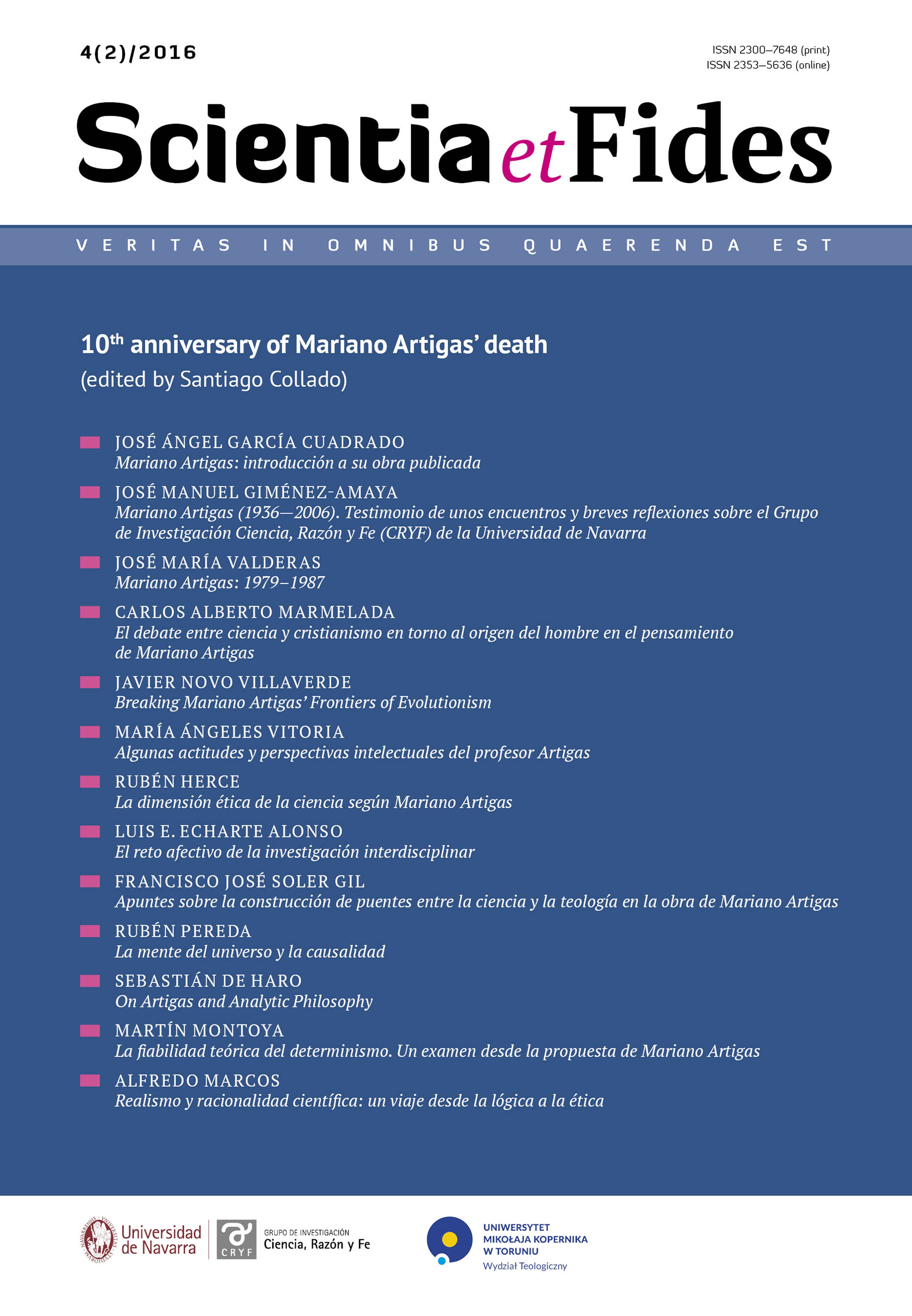Certeza razonable en ciencia y filosofía
Keywords
science, philosophy, knowledge, foundation, certainty, reasonabilityAbstract
Reasonable certainty in science and philosophy
It is argued that, as forms of knowledge, neither science is so safe nor philosophy is as arbitrary as often claimed. Mathematics and experimental science are founded on postulates that must be accepted axiomatically and cannot be justified with the rigor that is eventually expected from both disciplines. That acceptance entails the conscious or unconscious adoption of specific philosophical choices. The same can be said of other statements which enjoy so wide a consensus that their philosophical character is eclipsed. The ontological status of specific instances of such widely accepted assertions is discussed. It is concluded that, in the adventure of life, the elusive myth of sure knowledge must be replaced by the tangible prose of reasonable certainty. It is proposed that the necessary and successful vital bet on reasonable certainties, that already enjoy a wide consensus, may be extended to other philosophical spheres which so far have been perceived by some as the domain of the arbitrary.
References
Andersen, H., and B. Hepburn. 2016. “Scientific Method.” The Stanford Encyclopedia of Philosophy (Summer 2016 Edition), Edward N. Zalta (ed.), URL = <http://plato.stanford.edu/archives/sum2016/entries/scientific-method/>.
Artigas, M. 1985. Ciencia, razón y fe. Madrid: Palabra.
Artigas, M. 1999. La mente del universo. Pamplona: Eunsa.
Baghramian, M., and J. A. Carter. 2016. “Relativism.” The Stanford Encyclopedia of Philosophy (Spring 2016 Edition), Edward N. Zalta (ed.), URL = <http://plato.stanford.edu/archives/spr2016/entries/relativism/>.
Gilson, E. 1973. La unidad de la experiencia filosófica. Madrid: Rialp.
Gonzalo, J. 2000. Pioneros de la ciencia. Madrid: Palabra.
McDonald, D. G. 2001. “The Nobel laureate versus the graduate student.” Physics Today 54(7):46–51.
Hawking, S., y L. Mlodinow. 2010. El gran diseño. Barcelona: Crítica.
Heisenberg, S. 1972. Diálogos sobre la física atómica. Madrid: BAC.
Jaki, S. 1978. The road of Science and the ways to God. Chicago: The University of Chicago Press.
Jordan, P. 1972. El hombre de ciencia ante el problema religioso. Madrid: Guadarrama.
Kuhn, T. S. 2006. La estructura de las revoluciones científicas. Madrid: Fondo de Cultura Económica de España.
Latour, B., and S. Woolgar. 1986. Laboratory Life: The Construction of Scientific Facts. Princeton: Princeton University Press.
Mermin, N. D. 1985. “Is the moon there when nobody looks? Reality and the quantum theory.” Physics Today 38(4):38–47.
Planck, M. 1969. El coneixement del món físic. Barcelona: Edicions 62.
Planck, M. 2000. Autobiografía y últimos escritos. Madrid: Nívola.
Popper, K. 2008. La lógica de la investigación científica. Madrid: Tecnos.
Sols, F. 2013. “Can Science offer an ultimately explanation of reality?” Pensamiento 69 (261):685–689.
Sols, F. 2014. “¿Puede la ciencia ofrecer una explicación última de la realidad?” En Ciencia y Fe. En el camino de la búsqueda, editado por F. Molina. Madrid: CEU Ediciones.
Sols, F., e I. Sols. 2014. “¿Cuál es el método de las ciencias experimentales?” En 60 preguntas sobre ciencia y fe: Respondidas por 26 profesores de Universidad, editado por F. J. Soler Gil y M. Alfonseca. Madrid: Stella Maris.
Sols, I. 2016. “Racionalidad de la inducción como minimización entrópica.” Scientia et Fides 4/2: 461–482.
Downloads
Published
How to Cite
Issue
Section
License
CC BY ND 4.0. The Creator/Contributor is the Licensor, who grants the Licensee a non-exclusive license to use the Work on the fields indicated in the License Agreement.
- The Licensor grants the Licensee a non-exclusive license to use the Work/related rights item specified in § 1 within the following fields: a) recording of Work/related rights item; b) reproduction (multiplication) of Work/related rights item in print and digital technology (e-book, audiobook); c) placing the copies of the multiplied Work/related rights item on the market; d) entering the Work/related rights item to computer memory; e) distribution of the work in electronic version in the open access form on the basis of Creative Commons license (CC BY-ND 3.0) via the digital platform of the Nicolaus Copernicus University Press and file repository of the Nicolaus Copernicus University.
- Usage of the recorded Work by the Licensee within the above fields is not restricted by time, numbers or territory.
- The Licensor grants the license for the Work/related rights item to the Licensee free of charge and for an unspecified period of time.
FULL TEXT License Agreement
Stats
Number of views and downloads: 1662
Number of citations: 0



